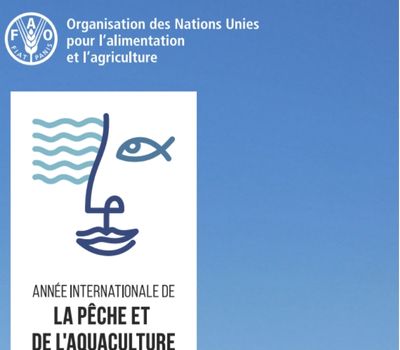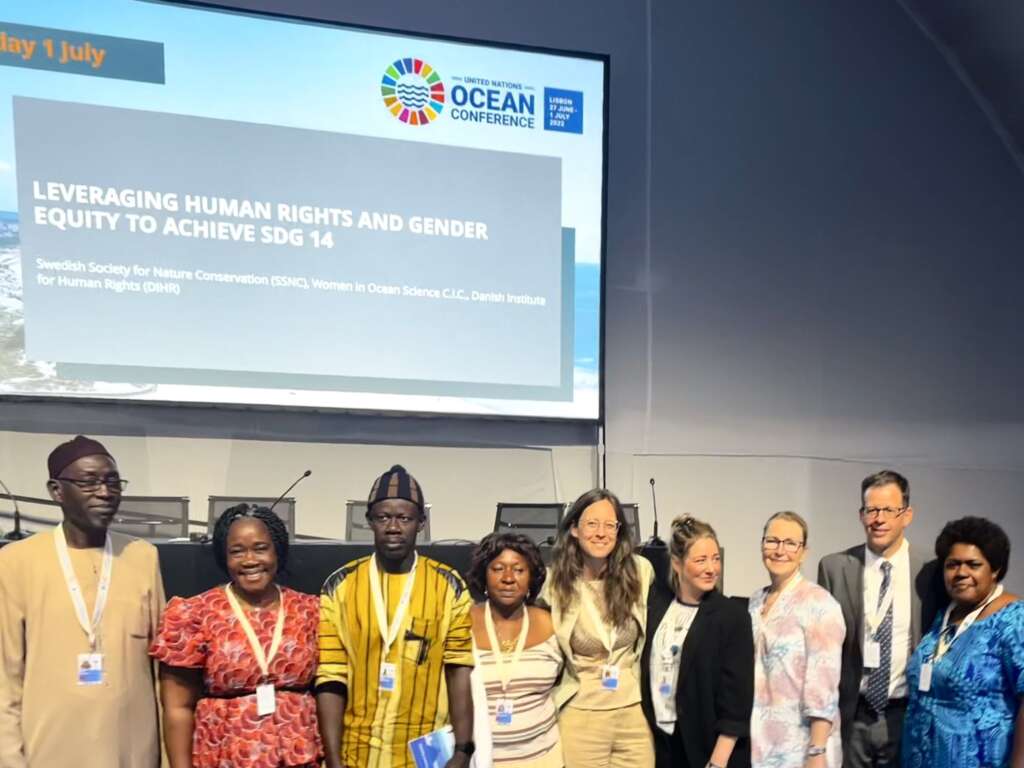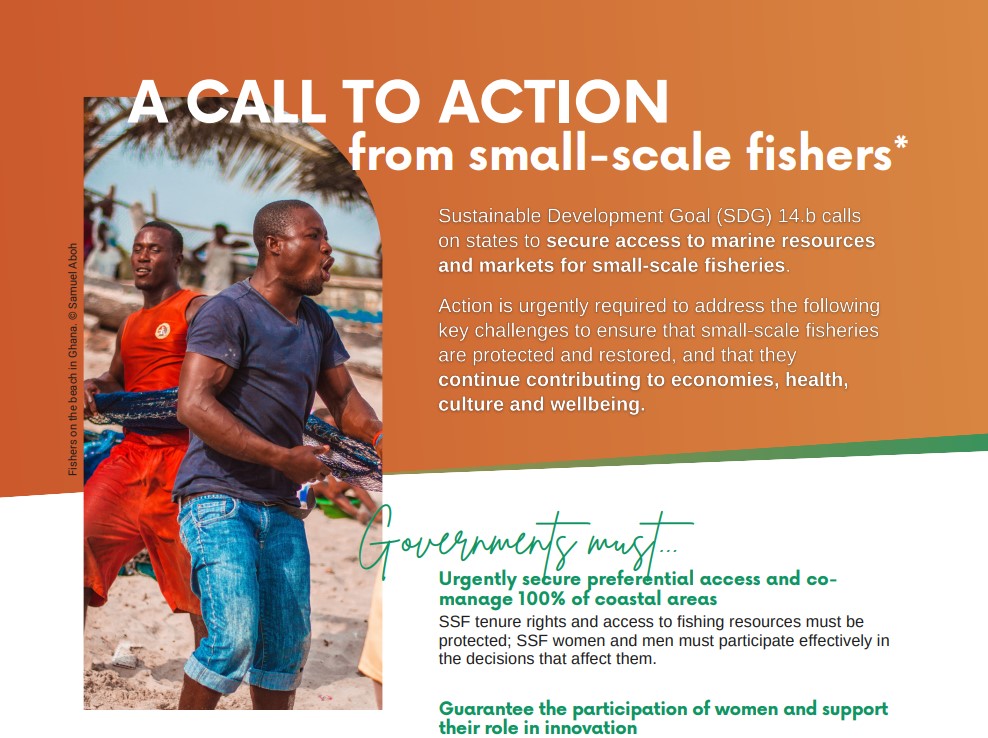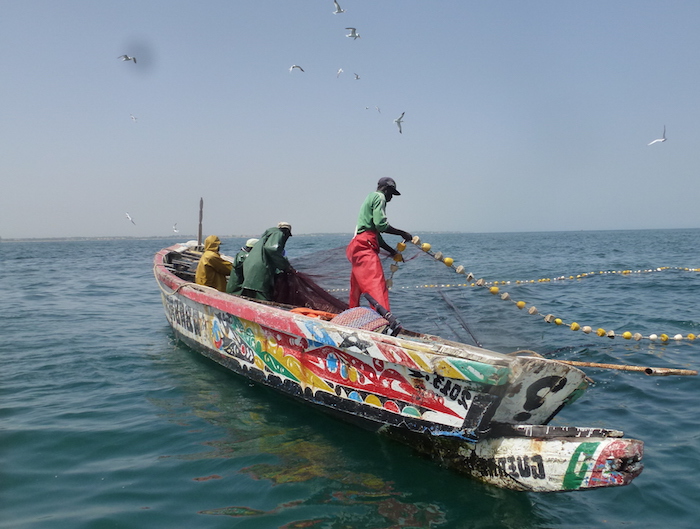The world celebrates World Fisheries Day (WFD) on 21 November 2022.
On this occasion, the President of the African Confederation of Professional Organizations of Artisanal Fisheries (CAOPA), Gaoussou GUEYE made a statement which we deliver the content.
“Ladies and Gentlemen,
Artisanal fishers are the most numerous users of the ocean. Millions of men, women and youth make their living from small-scale fisheries. Every day, despite great difficulties, their work allows hundreds of millions of people to get fish, a highly nutritious food, essential source of proteins, amino acids, minerals and vitamins. And this even during the Covid crisis! We are feeding the world. We are, indeed, too big to ignore.
In this International Year of Artisanal Fisheries and Aquaculture, to give a dignified and sustainable future to the men and women of our communities, we called on our governments to focus on Sustainable Development Goal 14.b, to guarantee access to resources and markets for artisanal fisheries.

Last year, at the World Fisheries Day, CAOPA members, representing fishers from 27 African countries, agreed on a set of priorities, rooted in the FAO Guidelines on sustainable small scale fisheries, that will give small-scale fisheries their rightful place at the center of public policies for the exploitation and conservation of the oceans.
All along this year, artisanal fishers organisations from the Pacific, Europe, North, South and Central America, Asia, have joined CAOPA in a common call to action. This call to action has been supported by many civil society organisations, in particular the African Platform of Fisheries non State Actors of the African Union. We promoted it at the EU-Africa Summit, we presented it, in Ghana, to the Ministers in charge of Fisheries and Aquaculture from African, Caribbean and Pacific countries, we presented it during the UN Ocean Conference and at the FAO 35th session of the Committee on fisheries.
So what are we asking for in this call to action?
First of all, we are asking governments to guarantee and protect artisanal fishers’ access to resources. We want to have exclusive and protected rights of access to the coastal zone. To ensure sustainable management that benefits the communities, we demand that 100% of these coastal areas be put under co-management.
But for co-management to work, several conditions should be met.
First of all, these coastal areas must be closed to industrial fishing. In many African countries, our fishermen have to face industrial fishing boats from Asian, Russian or European origin, fishing for the same fish in the same areas. Often, the ultimate beneficiaries of these operations hide behind the flag of an African coastal state. This is not illegal fishing. Most of the time, these boats have a license from our governments, and they use it to destroy our resources and livelihoods while our authorities turn a blind eye.

In coastal areas, it is important that our governments ensure that they will not take decisions on any new ocean use or activity, including the establishment of marine protected areas, without our free, prior and informed consent. We do not want marine protected areas to be decreed without consultation and prevent fishing communities from continuing their traditional activities overnight. We know of enough cases in countries like Madagascar, Senegal, Kenya and Côte d’Ivoire where communities are contributing to the protection of coastal ecosystems to set an example of what should be done.
Finally, for co-management to be effective, specific legal frameworks clearly defining the roles and responsibilities of authorities and fishers need to be put in place, and appropriate support needs to be provided to fishers to take their share of responsibilities. This is the case for various elements of co-management, such as participatory surveillance. It is good to provide fishers with cameras and geo-location devices to document the presence of vessels engaged in IUU fishing, and alert the authorities, but they need to be assured that the authorities will react swiftly and take dissuasive sanctions. Otherwise, they are putting themselves in danger at sea for nothing.
Women are present at all stages of the artisanal fisheries value chain and are the essential link in getting the fish to the consumers. But their work is unrecognised; their contribution, including to innovations, is not valued and their working and living conditions are dire. You will have seen the images of women working in the smoke for long hours, sometimes with their baby on the back. Which one of you, who among the decision makers, would accept their mother, their sister, their daughter to work in these conditions?
Our call to action emphasizes the need to prioritise investments that will improve women living and working conditions, such as access to potable water, electricity, drainage, sanitary facilities at processing sites; decent housing, day care centers near processing sites; and in training in the use of new technologies.

It is also crucial to recognize the access rights of women to the land where they process their fish, to help them access credit, and to support innovation in processing and marketing techniques, like the use of FTT ovens or solar energy for conservation and transport. Small-scale fish farming can also become a complementary source of raw material for women in artisanal fisheries, when fish is scarce, or when restricting management measures, like biological rest period, are introduced.
Good governance of ocean exploitation activities – anchored in stakeholder’s participation, transparent decision-making processes and accountability to citizens – is the essential foundation for the reforms needed to ensure sustainable fisheries for the benefit of coastal communities.
But if good governance is essential for fisheries, it is also true for other ocean exploitation activities, such as oil and gas exploitation, mineral extraction and coastal tourism. We make no secret of the fact that we are concerned today about the marginalisation of fisheries, and small-scale fisheries in particular, within the blue economy strategies of our countries.
We cannot survive if we have to compete with powerful, polluting, and environmentally destructive sectors in the marine and coastal environment, like oil and gas exploitation or coastal tourism. In the face of this threat, we call on governments to adopt a precautionary approach. Do not give the green light to a destructive blue economy!
We call on governments to develop, with the utmost transparency and with the participation of affected coastal communities, independent social and environmental impact assessments. We also call for consultation mechanisms to be put in place, in a way that allows for informed and active participation of communities, and for mechanisms to resolve conflicts between users of maritime spaces. Finally, all too often we see that communities affected by oil and gas projects, for example, never get redress for the harm done. This must change, and governments must put in place judicial and administrative mechanisms for redress from the outset.
Finally, I have to mention the impacts of climate change that are already affecting the future of our communities. I we want young men and young women to make a living from fishing in the future, measures have to be taken to help them face the impact of climate change. Fisheries governance must include Disaster Risk Reduction and emergency response, access to social rights, such as education, health and social security, and guarantee decent fishery dependent livelihoods. Specific policies and plans for climate change adaptation and mitigation, including restorative measures to ensure healthy marine ecosystems, and measures for disaster risk reduction and emergency response, have to be developed in a participative manner.

Ladies and gentlemen, these are the issues we want our governments to act upon. We firmly believe that action in these areas will enable sustainable artisanal fishing communities to thrive.
This call to action is not a desperate call, it’s a cry of hope. And for this cry to become louder, we ask you to join it.”
Thank you very much


